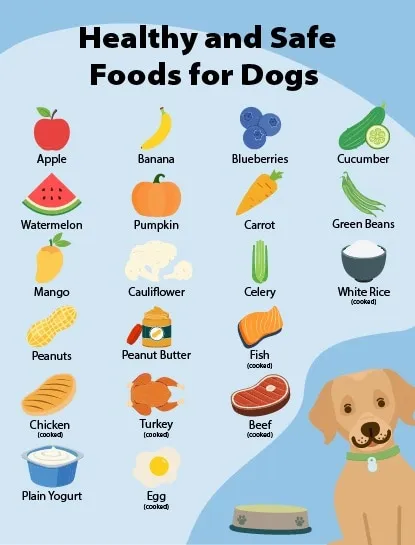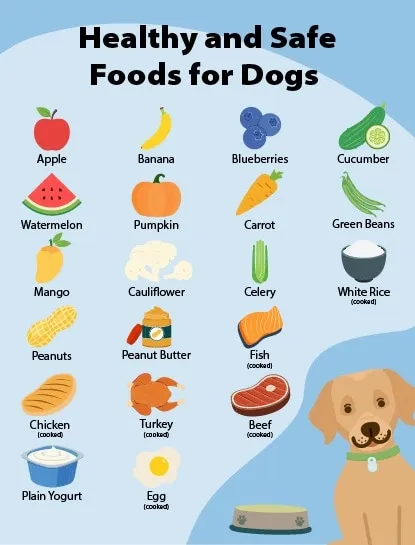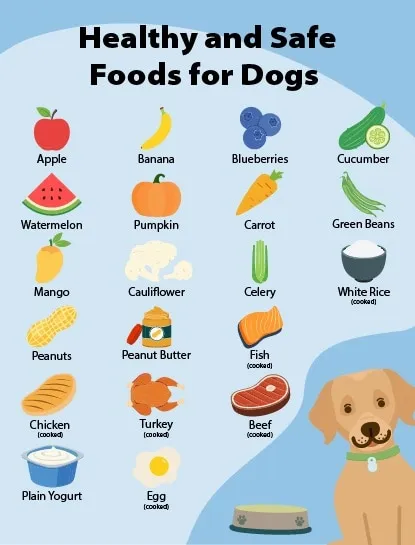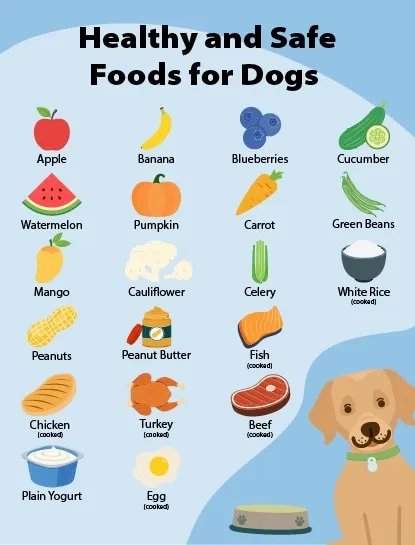As a loving dog owner, you’ve likely wondered which human foods are safe and beneficial to share with your furry companion. While commercial dog food provides complete nutrition, offering certain human foods in moderation can be a delightful way to add variety and extra nutrients to your dog’s diet. However, it’s crucial to know what human foods can dogs safely eat to avoid any health risks. This comprehensive guide will explore various healthy human foods that are good for dogs, detailing their benefits, proper preparation, and important precautions to ensure your pup enjoys these treats safely and happily. Always remember that these are treats and supplements, not replacements for a balanced dog food diet, and consulting your veterinarian before introducing new foods is always recommended.
Fruits for Fido: Sweet and Nutritious Options
Many fruits offer a healthy dose of vitamins, minerals, and fiber for your dog, making them excellent occasional treats.
Apples
Fresh apples are a fantastic, crunchy snack for dogs, provided you remove the seeds. This fruit is a good source of vitamins A and C, along as fiber, which is crucial for digestive health. Vitamin A bolsters the immune system, aids in bone growth, and promotes healthy skin and vision. Meanwhile, vitamin C can help reduce inflammation and boost immunity. Always core and slice apples into manageable pieces to prevent choking hazards and ensure no seeds, which contain trace amounts of cyanide, are ingested.
Bananas
Bananas are a tasty and easily digestible treat, particularly well-suited for older dogs with sensitive teeth. They offer numerous health benefits, including helping to lower blood pressure and supporting overall heart health. Bananas are rich in fiber, which aids digestion; folate (vitamin B9), contributing to healthy cell growth; lectin, which can improve blood sugar and intestinal health; and potassium, vital for fluid balance and kidney function. They also contain tryptophan, an essential amino acid that helps regulate the sleep-wake cycle, appetite, mood, and pain perception, along with immune-boosting vitamin C.
Blueberries
Often called nature’s superfood, blueberries are a delicious treat for both humans and dogs. They are an abundant source of vitamins and antioxidants, including vitamins C, K, and A. These powerful antioxidants may help reduce the likelihood of various diseases, disorders, and age-related issues, contributing to your dog’s long-term health. Due to their small size, blueberries are generally safe and can be given fresh or frozen as a refreshing snack.
Mango
Don’t keep this delightful tropical fruit all to yourself – mangoes are packed with fiber and vitamins A, B6, C, and E, making them a wonderful sweet treat for your canine friend. However, it’s vital to always remove the pit and peel, as both can cause your dog to become sick. The pit is a choking hazard and contains small amounts of cyanide, while the peel can be difficult to digest. Additionally, feeding too much mango could lead to stomach upset, so this is one treat to give in strict moderation.
Watermelon
Watermelon is a hydrating and refreshing fruit, especially on a hot day. It’s an excellent source of vitamins A, C, and B6. Its high water content makes it a great way to help keep your dog hydrated. Before offering watermelon to your dog, be sure to remove all seeds and the rind. The seeds can cause intestinal blockages, and the rind is tough to digest and can lead to stomach upset. Serve in small, bite-sized pieces.
 A happy dog enjoying a refreshing piece of watermelon on a hot day.
A happy dog enjoying a refreshing piece of watermelon on a hot day.
There are many what are things dogs can eat that can improve their health and happiness when given correctly.
Veggies for Vitality: Green Power for Pups
Vegetables provide essential nutrients and fiber, and many are low in calories, making them ideal for dogs needing to watch their weight.
Carrots
Carrots are a fantastic treat for dogs, offering a satisfying crunch that can help naturally remove plaque from their teeth. This vibrant orange root vegetable is also a good source of vitamin A, which supports vision, immune function, and skin health. Cold or frozen carrots can be particularly helpful for teething puppies, providing a soothing chew toy and easing discomfort. However, for young or small dogs, carrots can pose a choking hazard, so it’s important to cut them into small, manageable pieces before serving.
Cauliflower (Unseasoned)
Low in calories and rich in nutrients, unseasoned cauliflower can be a great supplement to your dog’s regular diet. It’s packed with fiber, antioxidants, folate, pantothenic acid, potassium, magnesium, manganese, phosphorus, choline, sulforaphane, and vitamins C, K, and B6. Despite these numerous benefits, cauliflower can sometimes cause gas in dogs, so it’s best to offer this treat in small amounts. It’s safe to share with your pup raw or cooked, but ensure it is always unseasoned to avoid ingredients harmful to dogs.
Celery
For pups who could benefit from a lighter snack, celery is an excellent choice. This crisp vegetable is notably low in fat and serves as a good source of fiber and vitamins A, C, and K. Additionally, celery is rich in folate, potassium, and manganese, which promote healthy metabolism, and it may even contribute to freshening your pet’s breath. Like carrots, celery can be a choking hazard due to its fibrous strings. To prevent any issues, always chop the veggie into bite-sized pieces, especially for smaller dogs.
Cucumbers
Similar to celery, cucumbers are a low-calorie, sodium-free, and fat-free crunchy treat that many dogs enjoy. Their high water content also makes them a hydrating snack. However, just like celery, cucumbers can present a choking hazard, particularly for smaller dogs or if given in large chunks. Always be sure to cut them into bite-sized pieces for your four-legged family member to ensure safe consumption.
Green Beans
Green beans are among the best foods on this list for overweight dogs due to their low-calorie and low-fat content. This versatile veggie is also a good source of fiber and vitamin C. You can offer your dog cooked green beans or give them frozen beans for a crunchy, cooling snack. Ensure they are plain, without any added salt, butter, or seasonings.
Pumpkin
Pumpkin is an incredibly beneficial supplement to any dog’s diet. It is remarkably rich in nutritional value, providing vitamins A, C, and E, along with minerals like iron and potassium. Its high soluble fiber content makes it exceptional for your dog’s digestion, helping to alleviate tummy issues such as diarrhea or constipation. Furthermore, pumpkin is rich in prebiotics, which support a healthy digestive tract. It is also low in calories, making it an excellent addition to your dog’s regular food. Always ensure that if you are buying canned pumpkin for your dog, it is pure pumpkin and not pumpkin pie filling, which often contains spices and sweeteners dangerous for dogs.
 A bowl of pureed pumpkin, a healthy digestive aid for dogs.
A bowl of pureed pumpkin, a healthy digestive aid for dogs.
When considering what food should be given to dogs, always prioritize whole, unprocessed options.
Protein Powerhouses: Meats and Eggs for Canine Health
Protein is vital for muscle development, energy, and overall health. Cooked, unseasoned meats and eggs can be excellent sources of this essential macronutrient.
Beef (Cooked)
Beef is a highly nutritious protein source that provides all the essential amino acids your dog needs, along with vital vitamins and minerals. If you choose to give your dog beef, it’s paramount to ensure it is fully cooked to eliminate any potential bacteria. Opting for grass-fed beef when possible is also beneficial, as it tends to be a better source of healthy fatty acids compared to grain-fed cattle. Always serve plain, lean cuts and remove any excessive fat or bones.
Chicken (Cooked and Unseasoned)
If your dog is experiencing an upset stomach, your veterinarian will likely recommend a bland diet of plain, boiled chicken and rice. Chicken is easily digestible, high in lean protein, and low in fat, making it ideal for sensitive tummies or as a delicious topper for your dog’s kibble. However, since dogs are omnivores and require a balanced diet beyond just meat, it’s best to offer chicken as a supplement or treat rather than a primary food source. Never give your dog chicken bones, especially cooked ones, as they can splinter and cause severe damage to your dog’s gastrointestinal (GI) tract.
Eggs (Cooked and Unseasoned)
Eggs are an excellent source of protein and are packed with numerous vitamins, including A, B, D, and K. Other important nutrients found in eggs include selenium, calcium, and zinc, all of which contribute to a super healthy treat for your dog. It is crucial to cook eggs thoroughly, as raw eggs can contain salmonella, which can make your dog sick. Your dog may enjoy scrambled eggs or even a hard-boiled egg as a nutritious complement to their regular diet.
Fish (Cooked and Unseasoned)
Fish, particularly salmon and sardines, are rich in high-quality protein and essential amino acids, while also being a fantastic source of omega-3 fatty acids. Omega-3s are known for supporting joint health, skin and coat quality, and cognitive function. An added benefit of sardines is that their soft, edible bones offer a valuable boost of calcium. It’s important to note that sardines are generally the only fish where you can safely leave the bones; for all other types of fish, it’s critical to remove all bones before feeding them to your dog. Always fully cook fish and limit your dog’s intake to no more than two servings per week to avoid overdoing it on fats and potential contaminants.
Turkey (Cooked and Unseasoned)
Similar to chicken, turkey is a lean and highly digestible source of protein for your dog. When preparing turkey for your canine companion, be sure to remove the skin, bones, and any excessive fat. The skin is high in fat, and bones (especially cooked ones) can splinter and cause internal damage. Any turkey you give your dog should be fully cooked and completely unseasoned, as many common seasonings are harmful to dogs.
 A delicious bowl of cooked, unseasoned turkey meat, a great protein source for dogs.
A delicious bowl of cooked, unseasoned turkey meat, a great protein source for dogs.
It is equally important to know what meat should i not feed my dog to prevent serious health issues.
Other Wholesome Additions for Your Dog’s Diet
Beyond fruits, vegetables, and meats, a few other common human foods can offer great nutritional benefits for dogs.
Peanuts (Unsalted) and Peanut Butter
Unsalted peanuts are a safe nut for dogs to eat. They contain beneficial fats and protein, but it’s important to offer them in moderation, as too much fat can lead to issues like weight gain or pancreatitis. Peanut butter offers the additional benefits of vitamins B and E, as well as fiber, all of which support cardiovascular and digestive health. Crucially, always ensure that the peanut butter you give your dog does not contain xylitol, a common artificial sweetener that is highly toxic to dogs and can cause a rapid drop in blood sugar and liver failure. Opt for natural, unsalted peanut butter with no added sugars or artificial ingredients.
White Rice (Cooked)
Cooked white rice is a staple recommendation for dogs needing a bland diet, often due to an upset stomach. It is easy to digest and helps firm up loose stool, providing relief for gastrointestinal upset. However, because rice can cause a spike in blood sugar, dogs with diabetes should only consume small amounts, if any, and only under veterinary guidance. Your vet can help you determine the appropriate amount of rice for your dog, especially if they have underlying health conditions.
Yogurt (Plain)
While some dogs can have difficulty digesting dairy products, plain yogurt can be a wonderfully healthy treat, especially due to its probiotic content. The probiotics found in yogurt can help strengthen your dog’s digestive system by promoting a healthy gut microbiome. However, it is absolutely essential not to give your dog yogurt with any added sugar, artificial sweeteners (especially xylitol), or fruit flavorings. These additives can be harmful or even toxic. Opt for plain, unsweetened yogurt, preferably with live and active cultures.
 A small portion of plain, unsweetened yogurt, a good source of probiotics for dogs.
A small portion of plain, unsweetened yogurt, a good source of probiotics for dogs.
Knowing what yogurt is safe for dogs is key to incorporating it into their diet.
Conclusion
Providing your dog with a varied diet that includes safe and healthy human foods can be a rewarding way to enhance their nutrition and bond with them. From the crispness of apples to the protein power of cooked chicken, many common foods can offer significant health benefits when given correctly. Remember, the golden rules are moderation, proper preparation (always plain and unseasoned), and avoiding any known toxic foods. Always consult your veterinarian before introducing new foods into your dog’s diet, especially if they have existing health conditions. A balanced commercial dog food should remain the primary source of nutrition, with these human treats acting as beneficial supplements. By following these guidelines, you can confidently share wholesome snacks with your beloved canine, contributing to a happy and healthy life for years to come.
